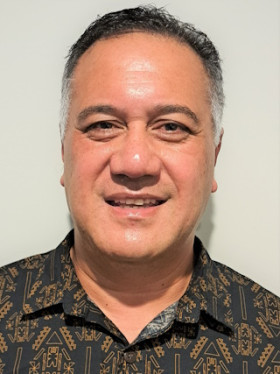Nga Vaka o Kaiga Tapu’s Samoan cultural framework training
Mapusua Fetuao Peleti works for Emerge Aotearoa as a service manager for their ‘Mental Health & Additions Pacific Community support team, and Mobile Community support team in Counties Manukau, Auckland.
 Mapasua attended the Nga Vaka o Kāiga Tapu’s Samoan cultural framework training, O Le Tōfā Mamao framework training and shares his thoughts on the training and how it will be applied within the Emerge Aotearoa practice.
Mapasua attended the Nga Vaka o Kāiga Tapu’s Samoan cultural framework training, O Le Tōfā Mamao framework training and shares his thoughts on the training and how it will be applied within the Emerge Aotearoa practice.
How long have you been in your role and what do you enjoy about your work?
Mapusua: I have been with the organisation for more than 10 years and in my current role for over 12 months. I enjoy the work that we do because it involves supporting our vulnerable Pacific people who experience mental health challenges. A significant part of my role is making sure my team has access to the right information and resources so that people are able to achieve their goals and aspirations.
As a family support worker, what were you hoping to learn from O Le Tōfā Mamao training?
Mapusua: I was hoping to gain more knowledge and learn ways on how to support our Samoan families dealing with family violence.
What are some of the cultural challenges you face in your work when dealing with Pacific client’s?
Mapusua: From my work with families and individuals I can identify how the challenges of being disconnected from their culture can result in family structures being dysfunctional. The value of the Vā- the Vā between parents and children, and between the siblings is significant in ensuring that culture values are embedded in families. Unfortunately, this is not happening. Another challenge is kids growing up in NZ with mixed ethnicities feel they do not belong to a culture and have doubts over their identity and sense of belonging.
How will you apply what you learnt to meet the challenges?
Mapusua: I learned from the O Le Tōfā Mamao training that language and culture play a vital role in connecting and trying to engage with families. Knowing the genealogy, the family or matai names will help when making connection during initial meeting. And if you think you are not the right support then seek the right support for the family. Using the Tōfā Mamao framework, we need to observe, listen, and access the situation with an open mind before making a decision.
Why is it good to learn with other Pacific colleagues who undertake similar work (participants, not just facilitators)?
Mapusua: It’s important that we receive the same teachings, information, and learnings. Also, very important that we share our knowledge and wisdom as everyone has different experiences and knowledge. It is about empowerment and upskilling our Pacific workforce as well.
What did you enjoy about the teaching from the facilitators?
Mapusua: I enjoyed the facilitators talking about real life scenarios and issues. Issues that we can all relate to. It was interactive, engaging and created healthy discussions and debate. It was also well facilitated. The ability of the facilitator to draw from our Samoan history/heritage and connect it with the current times and current issues made it relevant to me personally and professionally. The group discussions were good as it allowed us to hear and validate other perspectives and interpretation. I was grateful that the facilitators allowed for the Talanoa to flow without interruptions as to who was wrong or right, the ability to keep our Talanoa within respectful boundaries was good to see.
Nga Vaka o Kāiga Tapu - Samoan Family Violence Prevention Training Programme
O Le Tōfā Mamao is fundamental to the Samoan cultural practices to help Samoan people build safe and healthier families.
This FREE programme focuses on the values that underpin O Le Tōfā Mamao concept and its significance as a solution to prevent family violence. Both Samoan and English languages will be used to ensure your knowledge and experience is shared to enhance the discussion.
The Samoan Conceptual Framework O Le Tōfā Mamao was developed by the Sāmoan Working Group: Reverend Elama Maea, Judge Ida Malosi (facilitator), Siautu Alefaio-Tugia (facilitator), Paese William Pua, Rosalina Va’afusuaga, Papali’itele Tapuali’i Uitime, Tuu’u Mary Autagavaia, Norman Vaele, Tualamasala Kitiona Viliamu, Fa’amatuainu Tino Pereira, Yvonne Crichton-Hill, Peseta Betty Sio. It was written by Maiava Carmel Peteru with special acknowledgement to Dr Lonise Tanielu for the review of this document.
An important principle underpinning the dynamics of social and sacred encounters and interaction within fa’aSāmoa is the desire to maintain and protect peaceful relationships in ‘āiga (families), and between Sāmoan people. In the context of the Working Group discussions, tōfā mamao refers to the wisdom of ‘āiga and their social and religious communities as a critical pathway to fostering and nurturing wellbeing, and strong and vibrant families.
The purpose of tōfā is to ensure wellbeing is determined for all people and not for any one individual. Tōfā is love and compassion, and works to make possible freedom, and autonomy – so that all people are no longer burdened or overcome by suffering but live happy and fulfilling lives.
The word tōfā is wisdom achieved through the wise and judicious use of knowledge transmitted through family lore, and learnings from lifetimes of individual and collective experiences. Tōfā concerns thought that is reflective and contemplative, prudent, cautious, astute, and of good judgement. It involves individuals, families, groups of people, and whole communities.
To register your interest, CLICK HERE

O le tōfā mamao – A Sāmoan Conceptual Framework for addressing family violence
A Sāmoan Conceptual Framework for Sāmoan practitioners and mainstream organisations working with Sāmoan victims, perpetrators, and ‘āiga affected by family violence.